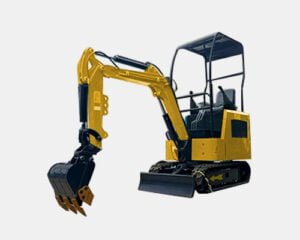When it comes to heavy construction equipment, excavators stand out as indispensable workhorses. These machines are designed to dig, lift, and move large quantities of earth and materials, making them crucial for a wide range of construction, mining, and infrastructure projects. The best excavators go beyond brute force; they incorporate cutting-edge technology, ergonomic designs, and advanced features to enhance productivity, efficiency, and safety on the job site. In this comprehensive guide, we’ll explore the top features that define the best excavators in the market.
Table of Contents
- Introduction
- Engine and Power
- Hydraulic System
- Digging Depth and Reach
- Operating Weight and Stability
- Cab Design and Operator Comfort
- Control Systems
- Attachments and Versatility
- Maintenance and Serviceability
- Safety Features
- Environmental Considerations
- Conclusion
- FAQ
1. Engine and Power
At the heart of every excavator is its engine, providing the necessary power for various tasks. The best excavators boast powerful and fuel-efficient engines that comply with emission standards. Advanced engine management systems optimize fuel consumption and reduce emissions, while delivering the required horsepower for heavy-duty digging and lifting operations.
2. Hydraulic System
Excavators heavily rely on hydraulic systems for their versatile movements. The best excavators feature sophisticated hydraulic systems that offer precise control over the boom, arm, and bucket movements. Variable flow technology adjusts hydraulic flow according to the task at hand, maximizing efficiency and minimizing energy waste.
3. Digging Depth and Reach
Excavators are renowned for their digging capabilities. The top excavators come with impressive digging depths and horizontal reaches, allowing operators to tackle a wide range of excavation tasks without frequent repositioning. This feature is particularly essential for large-scale construction projects.
4. Operating Weight and Stability
Stability is crucial for safe and efficient excavator operations. The best excavators are designed with an optimal weight distribution that enhances stability during operation. Advanced counterbalance systems and track designs contribute to maintaining equilibrium, even when lifting heavy loads.
5. Cab Design and Operator Comfort
Operators spend long hours inside the excavator cab, so comfort and visibility are paramount. The best excavators prioritize operator well-being with spacious cabs, ergonomic seating, and excellent visibility. Noise insulation and climate control further contribute to a comfortable working environment.
6. Control Systems
Modern excavators are equipped with advanced control systems that facilitate precise movements. These systems allow operators to perform intricate tasks with ease. Joystick controls, touchscreen interfaces, and even remote control options enhance operator control and productivity.
7. Attachments and Versatility
Excavators are versatile machines that can be fitted with various attachments to perform different tasks. The best excavators offer quick and efficient attachment swapping, enabling operators to transition between digging, lifting, and specialized tasks seamlessly. Common attachments include buckets, grapples, breakers, and augers.
8. Maintenance and Serviceability
Regular maintenance is essential to keep excavators in optimal working condition. The best excavators are designed with accessibility in mind, making it easier for technicians to perform routine maintenance and repairs. Features like easy access to engine components and centralized lubrication points streamline the maintenance process.
9. Safety Features
Safety is a paramount concern in any heavy machinery operation. The top excavators incorporate safety features such as 360-degree cameras, object detection systems, and stability monitoring. These features help prevent accidents and protect both operators and bystanders.
10. Environmental Considerations
As environmental consciousness grows, excavator manufacturers are striving to reduce their machines’ impact. The best excavators feature advanced engine technologies that minimize emissions and fuel consumption. Some models also incorporate hybrid or electric systems to further reduce their carbon footprint.
11. Conclusion
The best excavators represent a harmonious blend of power, technology, and design. They embody the industry’s commitment to enhancing productivity, operator comfort, and environmental responsibility. As construction and infrastructure projects continue to evolve, the top features of these excavators will play a pivotal role in shaping the future of heavy machinery.
12. FAQ
Q1: What size excavator do I need for my project?
The size of the excavator depends on the scale of your project. Smaller excavators are ideal for residential and light commercial tasks, while larger ones are suitable for major construction and mining projects.
Q2: Can excavators be used for tasks other than digging?
Absolutely. Excavators can be equipped with a variety of attachments such as hammers, augers, and grapples, allowing them to perform tasks like demolition, drilling, and material handling.
Q3: How do I ensure operator safety while operating an excavator?
Operator safety is paramount. Ensure operators are properly trained, follow all safety protocols, and make use of the excavator’s safety features, such as cameras and object detection systems.
Q4: Are hybrid or electric excavators worth considering?
Yes, hybrid and electric excavators are gaining popularity due to their reduced emissions and lower operating costs over time. They are especially suitable for projects with environmental concerns.
Q5: What maintenance practices are essential for excavator longevity?
Regular maintenance practices include checking fluid levels, lubricating moving parts, inspecting hydraulic hoses, and cleaning air filters. Follow the manufacturer’s recommended maintenance schedule for best results.
Q6: Can excavators work on uneven terrains?
Yes, many excavators are equipped with advanced track systems that provide stability and traction on uneven terrains, allowing them to operate effectively in various conditions.
In conclusion, the best excavators combine power, technology, and safety to deliver outstanding performance on job sites. Whether it’s the precision of the hydraulic system or the comfort of the operator’s cab, these features work together to define excellence in excavator design. As technology continues to advance, the future promises even more innovative features that will shape the construction industry for years to come.



